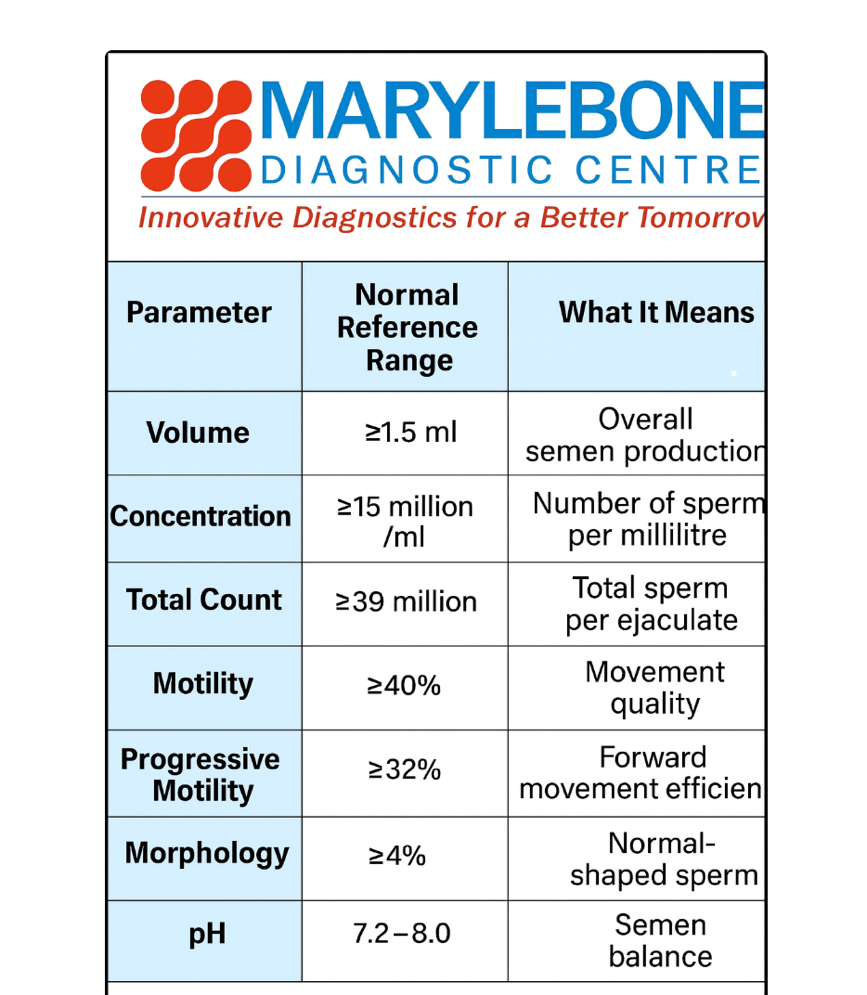
Semen Analysis – Purpose, Procedure, and Results
A semen analysis is one of the most important tests in male fertility. It gives a detailed view of sperm health, quality, and function. For many men, it provides the first clear answer after months of uncertainty.
At Marylebone Diagnostic Centre (MDC), we specialise in private semen analysis and fertility testing. Our clinic, located at 73 Baker Street, London, offers fast, discreet, and reliable results under the Marylebone High Standard of care.
What is a semen analysis?
A semen analysis examines the semen – the fluid containing sperm – to assess fertility potential. It looks beyond sperm count alone, measuring how sperm move, their structure, and overall sample quality.
Clinicians use it to:
- Diagnose causes of male infertility
- Assess sperm quality after a vasectomy
- Check results after treatment or lifestyle changes
- Evaluate hormonal or medical concerns affecting fertility
The test is simple but extremely informative.
Why it’s important
Many fertility challenges are related to sperm quality, not just quantity. You can have a normal sperm count but poor motility or shape. Likewise, some men with lower counts still conceive naturally.
A semen analysis helps clarify these details. It also identifies patterns that may need further testing, such as DNA fragmentation or hormone imbalance.
What a semen analysis measures
The analysis looks at several key parameters:
- Volume – the total amount of semen produced.
Normal: 1.5 ml or more. - Sperm concentration (count) – how many sperm are in each millilitre of semen.
Normal: 15 million sperm/ml or higher. - Motility – how sperm move.
Normal: At least 40% should show movement, with 32% progressive motion. - Morphology – how sperm look under a microscope.
Normal: At least 4% with a normal shape. - Liquefaction and viscosity – how quickly semen becomes liquid, affecting movement.
- pH and colour – help identify infection or blockage.

These measurements give a complete picture of sperm health.
How to prepare for a semen analysis
Preparation is simple but important.
- Avoid ejaculation for 2 – 5 days before testing.
- Do not consume alcohol or smoke for at least 48 hours.
- Stay hydrated and maintain regular rest.
- Avoid hot tubs, saunas, and excessive cycling for a week before the test.
These steps ensure a consistent sample for accurate results.
The procedure at Marylebone Diagnostic Centre
We understand that privacy matters. That’s why every test at Marylebone Diagnostic Centre is carried out discreetly and with care.
- Booking your test
Book online or by phone for a time that suits you. - Sample collection
You can provide a sample in our private collection room at 73 Baker Street. In some cases, you may collect at home under strict conditions. - Laboratory analysis
Our trained biomedical scientists analyse the sample under a microscope and using automated counting methods. Each parameter is reviewed carefully. - Results and explanation
Results are usually ready within 24 hours. Your clinician explains the findings and next steps clearly – no jargon.
All samples are handled according to strict chain-of-custody and temperature standards.
Understanding your results
Your report may look technical, but the meaning is straightforward.
| Parameter | Normal Reference Range | What It Means |
| Volume | ≥1.5 ml | Overall semen production |
| Concentration | ≥15 million/ml | Number of sperm per millilitre |
| Total Count | ≥39 million | Total sperm per ejaculate |
| Motility | ≥40% | Movement quality |
| Progressive Motility | ≥32% | Forward movement efficiency |
| Morphology | ≥4% | Normal-shaped sperm |
| pH | 7.2–8.0 | Semen balance |
If one or more parameters are low, it does not necessarily mean infertility. Sperm health changes over time, and even mild abnormalities can improve.
Linked fertility profiles at MDC
To help patients get the clearest picture, Marylebone Diagnostic Centre offers three key fertility packages:
Semen Analysis – £179
Basic fertility screen measuring count, motility, and morphology.
Comprehensive Fertility Profile – £545
Includes semen analysis, hormonal blood tests (FSH, LH, Testosterone, SHBG, Prolactin, Albumin, PSA), and sperm photographs.
Advanced Care Profile – £932
Includes DNA fragmentation, hormone testing, mineral hair analysis, and semen analysis – ideal for couples trying for over 12 months or after IVF failure.
These profiles help identify subtle issues that basic semen analysis might miss.
What happens if results are abnormal
If your results fall below normal ranges, our team will help identify why. Low counts, poor motility, or irregular shape can have different causes – hormonal, genetic, or lifestyle-related.
Next steps may include:
- Blood tests for hormones
- Scrotal ultrasound (if varicocele suspected)
- DNA fragmentation test
- Repeat semen analysis after 3 months
MDC offers a guided pathway, ensuring each follow-up test has a clear purpose.
How often should you repeat the test?
Because sperm production cycles take about 70–90 days, repeating a semen analysis after three months provides the most accurate trend.
Lifestyle improvements and treatment often lead to noticeable changes within this timeframe.
Factors that affect results
Your semen analysis reflects your health over the previous three months.
Certain factors can lower your results temporarily:
- Illness or fever
- Recent stress or poor sleep
- Alcohol or drug use
- Smoking
- Poor nutrition
- Heat exposure
- Tight clothing or long drives
Discussing your lifestyle honestly with your clinician helps interpret the results correctly.
Improving semen quality naturally
Positive habits can significantly improve sperm health:
- Eat a balanced diet with zinc, selenium, vitamin C, and folate.
- Exercise regularly but avoid overtraining.
- Stay hydrated and maintain a healthy weight.
- Manage stress with mindfulness or meditation.
- Limit alcohol and avoid smoking.
- Get 7-8 hours of sleep each night.
MDC clinicians can also guide you on supplements that support sperm function safely.
Home semen testing vs. laboratory analysis
Home sperm count kits are becoming popular, but they measure only sperm presence or rough quantity. They cannot assess movement, shape, or health.
At Marylebone Diagnostic Centre, our lab testing provides complete insight into all sperm parameters, making it the preferred choice for medical accuracy.
FAQs
Why choose Marylebone Diagnostic Centre
- Discreet testing in the heart of London
- Rapid, accurate results reviewed by biomedical scientists
- Personalised follow-up advice and fertility planning
- Friendly clinical team who explains everything clearly
- Packages tailored to every fertility stage
At Marylebone Diagnostic Centre, we believe fertility testing should be straightforward, supportive, and built on trust.
Book your semen analysis today
Understanding your sperm health is the first step toward improving it. Whether you’re trying to conceive or checking your fertility baseline, we’re here to help.
Book your Semen Analysis or Comprehensive Fertility Profile today at Marylebone Diagnostic Centre, 73 Baker Street, London W1.
Call +44 7495 970109 or visit marylebonediagnosticcentre.com.
Knowledge leads to clarity – and clarity helps you take control of your fertility journey.










